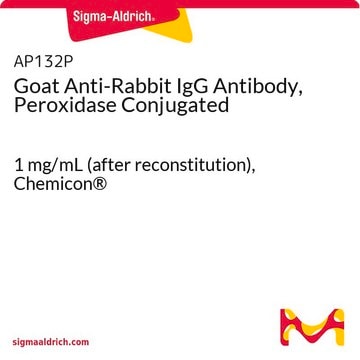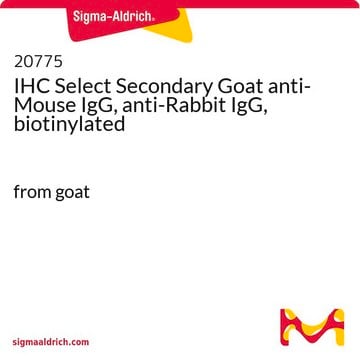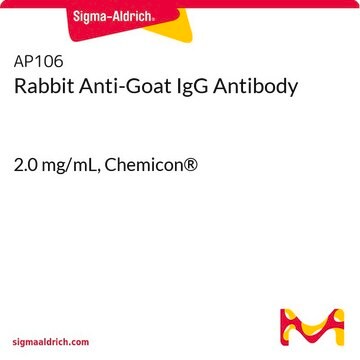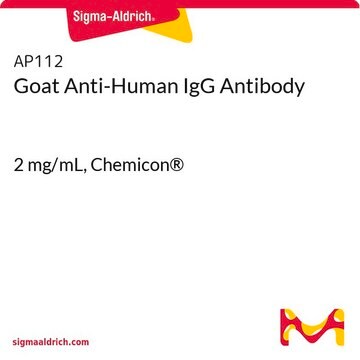AP132-M
Goat Anti-Rabbit IgG Antibody
2 mg/mL, Chemicon®
Iniciar sesiónpara Ver la Fijación de precios por contrato y de la organización
About This Item
UNSPSC Code:
12352203
eCl@ss:
32160702
Productos recomendados
biological source
goat
Quality Level
conjugate
unconjugated
antibody form
affinity purified immunoglobulin
clone
polyclonal
species reactivity
rabbit
manufacturer/tradename
Chemicon®
concentration
2 mg/mL
technique(s)
ELISA: suitable
immunofluorescence: suitable
western blot: suitable
shipped in
wet ice
General description
Immunoglobulin G (IgG), is one of the most abundant proteins in human serum with normal levels between 8-17 mg/mL in adult blood. IgG is important for our defence against microorganisms and the molecules are produced by B lymphocytes as a part of our adaptive immune response. The IgG molecule has two separate functions; to bind to the pathogen that elicited the response and to recruit other cells and molecules to destroy the antigen. The variability of the IgG pool is generated by somatic recombination and the number of specificities in an individual at a given time point is estimated to be 1011 variants.
Specificity
Reacts with Rabbit IgG gamma chain, as well as the light chains from all Rabbit immunoglobulin classes. Monospecific on IEP against whole Rabbit Serum.
Immunogen
Highly purified Rabbit IgG isolated from pooled normal Rabbit Serum.
Application
Goat anti-Rabbit IgG Antibody is an antibody against Rabbit IgG for use in ELISA, IP & WB.
Research Category
Secondary & Control Antibodies
Secondary & Control Antibodies
Research Sub Category
Whole Immunoglobulin Secondary Antibodies
Whole Immunoglobulin Secondary Antibodies
Storage and Stability
Store at +2-8°C.
Legal Information
CHEMICON is a registered trademark of Merck KGaA, Darmstadt, Germany
Disclaimer
Unless otherwise stated in our catalog or other company documentation accompanying the product(s), our products are intended for research use only and are not to be used for any other purpose, which includes but is not limited to, unauthorized commercial uses, in vitro diagnostic uses, ex vivo or in vivo therapeutic uses or any type of consumption or application to humans or animals.
Certificados de análisis (COA)
Busque Certificados de análisis (COA) introduciendo el número de lote del producto. Los números de lote se encuentran en la etiqueta del producto después de las palabras «Lot» o «Batch»
¿Ya tiene este producto?
Encuentre la documentación para los productos que ha comprado recientemente en la Biblioteca de documentos.
Los clientes también vieron
The promotion of human mesenchymal stem cell proliferation by superparamagnetic iron oxide nanoparticles.
Dong-Ming Huang,Jong-Kai Hsiao,Ying-Chun Chen,Li-Ying Chien,Ming Yao,Yin-Kai Chen et al.
Biomaterials null
Effect of body condition score of the dairy cow on the in vitro immune response of peripheral blood mononuclear cells to progesterone stimulation.
Ohtsuka H, Murase Y, Ando T, Kohiruimaki M, Mukai M, Oikawa M, Petrovski KR, Morris S
The Journal of Veterinary Medical Science null
Bingbing Liu et al.
The Journal of surgical research, 169(2), e175-e184 (2011-05-24)
The present study sought to investigate pathologic changes in tendon, expression of basic fibroblast growth factor (bFGF) and collagen type I, and effects of safflower yellow (SY) on the process of tendon injury-repair. A tendon injury-repair model was used, and
J V Joseph et al.
Cell death & disease, 5, e1443-e1443 (2014-10-03)
Different molecular subtypes of glioblastoma (GBM) have been recently identified, of which the mesenchymal subtype is associated with worst prognoses. Here, we report that transforming growth factor-β (TGF-β) is able to induce a mesenchymal phenotype in GBM that involves activation
Mihai G Mehedint et al.
FASEB journal : official publication of the Federation of American Societies for Experimental Biology, 24(1), 184-195 (2009-09-16)
Maternal choline availability is essential for fetal neurogenesis. Choline deprivation (CD) causes hypomethylation of specific CpG islands in genes controlling cell cycling in fetal hippocampus. We now report that, in C57BL/6 mice, CD during gestational days 12-17 also altered methylation
Nuestro equipo de científicos tiene experiencia en todas las áreas de investigación: Ciencias de la vida, Ciencia de los materiales, Síntesis química, Cromatografía, Analítica y muchas otras.
Póngase en contacto con el Servicio técnico













